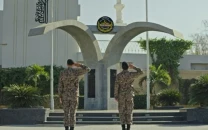Arab Spring, Qaddafi’s fall
Rebels must not substitute vengeance for justice. Focus should be to unite Libya and shape its political transition.

Arab Spring, Qaddafi’s fall
The Libyan rebels still have a fight on their hands. Their forces have taken much of Tripoli, but Qaddafi and Seif al-Islam, his son and heir apparent, are still at large. They still command some forces, while Sabha and Qaddafi’s hometown of Sirte remain loyalist redoubts. But there is little doubt that the end is nigh for the regime that has ruled the country with an iron fist for four decades.
The end of the beginning of the Libyan revolution is certainly time for the Libyan people to rejoice. But for the rebel leaders, it is also a crucial period to consolidate the revolution by asserting the primacy of politics over military affairs. Foremost, the rebels must resist the temptation to substitute vengeance for justice. Moreover, skirmishes with remnants of Qaddafi’s forces must not detract from carefully uniting the country and shaping its political transition.
The National Transitional Council has been generally recognised, formally or not, by the international community as the legitimate Libyan government. But the rebel movement has been largely decentralised. The Council has been based in the eastern city of Benghazi. Rebel forces under their direct command held the line at Marsa el Brega, though they consistently contested Qaddafi’s control as far west as bin Jawad. A second front was opened by rebels in the city of Misrata, just east of Tripoli. With their backs to the sea, the rebels prevailed in bloody urban battles. The Council’s forces kept open a seaborne supply line to the city, but their relationship with the Misrata-based rebels has not been without friction. A third front was opened by the Berber guerrillas in the rugged Nafusa Mountains in the southwest. It was their move on the cities of Gharyan and Zawiya that choked off Qaddafi’s final lifeline to Tunisia. This turned the tide of the war, opening the road to Tripoli. And then, of course, there were the brave souls within Tripoli whose second uprising was critical in finally bringing down Qaddafi.
The Council is formally in charge, but undoubtedly on-the-ground leadership will have been forged by other rebel fronts in the heat of the battle. Libyans across the country have struggled with great courage and conviction; the first order of the Council must be to include them within the interim ruling structure. Then, it should go a step further and reach out to Qaddafi’s strongholds as well.
There are other tensions too. Radical Islamist militias, such as the Libyan Islamic Fighting Group whose members have appeared in theatres from Iraq to Afghanistan, have also been active in the east of the country. There is unease in the Council already about how to deal with them. Still alarmist scenarios played by some western media outlets are highly unlikely to materialise. A strong national identity will allow the historical rivalry between Tripolitania and Cyrenaica to play out within a national context rather than as the fractious infighting of Somalia or Afghanistan. Nor is a massive breakdown in law and order likely as happened when Baghdad fell in 2003. The rebel-held towns have already proven themselves to be orderly and more or less adeptly managed.
Libya certainly has many positive factors weighing in its favour. It is sparsely populated and endowed with great oil wealth. It has decent physical and social infrastructure, even if economically it has much work to do. Further, assets seized worldwide from Qaddafi’s regime currently amount to about $50 billion, and may increase five-fold in the coming months — a handsome nest egg for any incoming regime.
But where Libya goes from here is no straight trajectory. Nor should it be. It would be unbecoming for an interim government — or much worse, for outsiders — to chart-out Libya’s long-term course. For the first time in its history, Libya has the potential to truly belong to its people. Let the Council oversee a democratic transition. Let Libyans decide Libya’s fate.
Published in The Express Tribune, August 27th, 2011.



















COMMENTS
Comments are moderated and generally will be posted if they are on-topic and not abusive.
For more information, please see our Comments FAQ